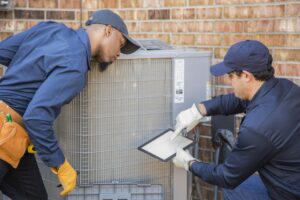
Your air conditioner doesn’t have to completely bite the dust for you to replace it. You’ve had that AC for a while, and it’s not unreasonable to assume it’s lost its efficiency as the years have gone by. When considering a new HVAC system, it’s important to look at both your air conditioner and furnace as a combined system, since they work together to provide reliable comfort throughout the year. Replacing both your furnace and air conditioner at the same time can offer greater efficiency, cost savings, and convenience, especially if both units are aging or require frequent repairs. Professionals often recommend replacing both units together to maximize compatibility and long-term benefits. Replacing both an AC and a furnace at the same time can save homeowners between $2,000 and $5,000 on installation costs. If replaced separately, the combined cost of both an AC and a furnace is between $7,500 and $13,500. The total cost for replacing both units simultaneously typically ranges between $6,500 and $12,500. Additionally, installing both systems at once can minimize the frequency of repairs by ensuring that everything is new and less prone to issues.
When should you install a new AC (or furnace) before it fails?
- To support home additions: A new unit ensures your HVAC keeps pace with added square footage and avoids strain from being improperly sized.
- To lower energy bills: Systems over ten years old lose efficiency, even with maintenance, making replacement more cost-effective.
- To boost property value: A modern HVAC system increases appeal and sale price by offering move-in readiness.
- To benefit from rebates: Programs like the Inflation Reduction Act (2023) and other incentives can significantly lower upgrade costs.
Upgrading your air conditioning unit is a great opportunity to improve your home’s energy efficiency and comfort. The quality of the hvac installation directly impacts your new system’s performance and long-term reliability, so choosing a reputable installer is crucial. A properly matched furnace and air conditioner provide a seamless, year-round comfort solution. Replacing your ac and furnace together can lead to improved efficiency and cost savings, particularly when both systems are over 10-15 years old or you’re planning an efficiency upgrade. The efficiency of HVAC systems manufactured today is significantly higher than that of systems built 10 to 15 years ago. The cost to replace an air conditioner typically ranges from $4,000 to $7,000, depending on the model and efficiency level. Additionally, the cost to replace a furnace ranges from $3,500 to $6,500.
Installation costs and installation price can vary significantly depending on the efficiency levels of the new systems you select, as higher efficiency models often have a higher upfront investment but can save you more over time. Considering efficiency levels when selecting a new system is important, as higher efficiency can lead to long-term savings and better performance. Energy-efficient systems generally have higher upfront installation costs but result in savings on monthly utility bills. The system’s performance is also directly affected by the quality of the hvac installation, making it essential to invest in professional service for optimal results. The efficiency levels of HVAC units, indicated by SEER and AFUE ratings, play a significant role in determining the total installation price. The installation cost of a new HVAC system typically includes $1,500 for labor. The average cost to install an HVAC system is about $4,750.
The point is, there’s more than a few reasons to get AC installation in Shreveport simply to replace your current AC for an upgrade.
Introduction to Air Conditioning Replacement
Replacing your air conditioner is a major decision that goes beyond simply swapping out an old unit for a new one. It’s an investment in your home’s comfort, energy efficiency, and long-term value. When considering a new HVAC system, it’s important to look at both your air conditioner and furnace as a combined system, since they work together to provide reliable comfort throughout the year. Upgrading your air conditioning unit can improve your home’s heating and cooling performance, reduce energy bills, and ensure your system is ready to handle the demands of every season. By choosing a new, energy-efficient system tailored to your home’s needs, you’ll enjoy better efficiency, lower maintenance costs, and a more comfortable living environment.
Installing a New AC for Home Additions
You’re ready to expand your home, but right now your AC is only powerful enough to handle the square footage you already have. While it would be nice to simply add another room and call it a day, you have to consider how much your current AC can properly handle.
When your AC was installed in the first place, it was fitted for your available living space. You don’t want an AC that’s too powerful, or one that’s too weak (for obvious reasons), but when you expand your home, it changes the game. When planning an addition, it’s important to choose the correct size furnace to ensure your heating system can efficiently handle the increased space. This is the perfect time for an upgrade for both efficiency and capacity. You should also evaluate your current heating system to determine if it can integrate well with new air conditioning units and meet the demands of your expanded home. Additionally, check if your indoor unit is compatible with the new system or if it needs to be upgraded or replaced to match the requirements. The compatibility of your AC and furnace is crucial, as they share the indoor blower motor and system performance can degrade if mismatched. If your air conditioning unit is old and failing, but your gas furnace is newer, then replacing just the AC system may be the right choice. You can replace just your air conditioner if you have a gas furnace. Plus, skipping regular maintenance and putting off repairs can exacerbate existing issues, which is why it’s wise to consider AC replacement sooner rather than later.
Factors Impacting Replacement Decisions
When it comes time to replace your air conditioning unit, several factors should guide your decision. The age and efficiency of your current system play a big role, older units tend to be less energy efficient and more prone to breakdowns. You’ll also want to consider the cost to replace your system versus the potential savings on your energy bills with a more energy efficient system. The size and layout of your home, the quality of insulation, and even the type of windows you have can all impact how well your heating and cooling system performs. Don’t forget to factor in your fuel source, such as natural gas or electricity, as this can affect both operating costs and your options for upgrading. Geographic location affects the price of HVAC installations, with larger cities generally having higher costs. Consulting with a trusted HVAC contractor can help you evaluate these factors and choose the best system for your needs, ensuring you get the most out of your investment.
Air Conditioning System Types
Today’s homeowners have several options when it comes to air conditioning systems, each with its own set of benefits. Central air conditioning systems are the most common, working alongside your furnace to deliver consistent heating and cooling throughout your home. Heat pump systems are another popular choice, offering both heating and cooling in one unit and often providing greater energy efficiency, especially in milder climates. For homes without existing ductwork, ductless systems can be a cost effective solution, allowing for flexible installation and zoned comfort. When selecting a new air conditioning system, it’s important to consider factors like energy efficiency ratings, maintenance needs, and how the system will fit your home’s unique requirements. The minimum SEER requirement for air conditioning units is 14 in northern states and 15 in southern states as of January 2023. The right choice can lead to lower energy bills, quieter operation, and improved comfort year-round.
Reducing Energy Bills with a New AC
This happens as your current air conditioner starts to give out. Take a good hard look at your AC’s age, and if it’s around or beyond the ten-year mark, efficiency just won’t be what it used to be. That’s for certain.
If you’re keen on regular maintenance, and you do everything you can to save on cooling costs, but your bills are still going up, it’s just proof that your AC is aging out. Upgrading to new systems can help save money on energy costs by improving efficiency and reducing waste. Installing multiple new systems at once, such as both air conditioners and furnaces, can further boost efficiency and simplify installation. Modern air conditioners are designed to reduce energy consumption and work best when matched with compatible furnaces for optimal performance. Upgrading to a gas furnace is especially beneficial for homes using natural gas, offering reliable heating and improved efficiency. Gas furnaces with high annual fuel utilization efficiency (AFUE) ratings can further reduce your energy bills by maximizing fuel use. Modern furnaces are recommended to have an AFUE of 90% or higher for efficient performance. The most efficient furnaces available today have an AFUE of up to 98%. Even if you do everything right, this will still happen eventually. Ignoring these signs and postponing essential upkeep could lead to common AC troubles that occur due to neglect, which makes upgrading your system even more appealing.
Enhancing Property Value with a New AC
Your house has been updated, your lawn is landscaped to perfection, and you’re ready to sell–but that old air conditioner is definitely holding you back. Most homebuyers want something that’s completely move-in ready, and that means updated appliances.
You can increase your asking price by more than the total cost of your new AC installation simply because it saves time and stress for the prospective homebuyers. Additionally, the installation price of a new, energy-efficient system can often be offset by the increased property value and greater buyer appeal. However, be cautious of lower prices from less reputable providers, as these can lead to poor installation and costly issues down the line. Some companies may also try to get you to spend more money than necessary by recommending unnecessary upgrades or replacements. To ensure quality and reliability, always choose a reputable service provider or professional company for your HVAC installation. It’s also wise to consult multiple hvac companies to compare quotes and services before making your final decision. Bundling your HVAC installations can result in significant cost savings due to reduced labor time and possible promotional discounts from installation companies. If you’re preparing to sell your home, it may not be necessary to replace both units unless they are aged or malfunctioning. If you want to spike that property value before this little piggy goes to market, this is how you do it.
Complexity of Installation
Installing a new air conditioning system is a complex process that requires expertise and attention to detail. A professional HVAC contractor will start by assessing your home’s heating and cooling needs, ensuring the new system is properly sized for optimal performance and efficiency. The installation process involves connecting the new air conditioning system to your existing furnace and ductwork, making sure everything is integrated seamlessly for reliable comfort. Quality installation is essential, not only does it ensure your new system operates efficiently, but it also helps prevent future issues and extends the life of your equipment. By working with a qualified contractor, you can be confident that your new heating and cooling systems will deliver the performance and energy savings you expect.
Leveraging Government Incentives and Rebates
The Inflation Reduction Act is one great example of this. It rolled out in early 2023, and offers an extremely long timespan for homeowners to upgrade their HVAC systems. You could upgrade from an AC to a heat pump and pay an extremely small price with instant rebates. The amount of savings and rebates you receive can vary based on the type of system you choose and the local programs available.
Upgrading to a heat pump system can provide greater energy efficiency and comfort, but it’s important to have it professionally installed to ensure optimal performance and longevity. In some cases, it may be appropriate to replace only the outdoor AC unit instead of the entire system, but a professional assessment is essential to determine the best option for your home.
The best part of this is that you’ll be lowering your monthly utility bills and saving money on the cost of the installation. Money that you don’t have to pay back. Always check for state and local programs as well. You can also improve your home’s indoor air quality by investing in professional duct cleaning services, which pairs perfectly with your new AC installation.
Upgrade Your AC for Better Efficiency
If your AC is already older than ten years, it’s reasonable to replace it before you have to endure more frequent breakdowns and problems. You might also consider replacing the furnace separately, especially if it is newer or still functioning efficiently, but be sure to weigh the costs and benefits of this approach. Replacing both your AC and furnace at the same time can improve overall system efficiency and may lead to greater long-term savings. However, be cautious of recommendations to replace both units just to spend more money when it may not be necessary. It saves you stress, and will lower your monthly utility costs at the same time–it sounds like a win-win if you ask us.
Maintaining Your New AC Unit
Once your new air conditioning unit is installed, regular maintenance is key to keeping it running smoothly and efficiently. Scheduling annual check-ups with a professional HVAC contractor allows for early detection of potential issues and ensures your system is always operating at its best. Simple tasks like replacing air filters, cleaning condenser coils, and keeping the area around your outdoor unit clear can make a big difference in your system’s performance and longevity. Staying on top of maintenance not only helps prevent unexpected breakdowns but also keeps your energy bills in check and ensures reliable comfort for your family all year long. With a little care and attention, your new air conditioning unit will provide optimal performance and peace of mind for years to come.
Moon’s Air has provided whole-home comfort since 1971. Call us for service today—it’s good to be Mooned!









